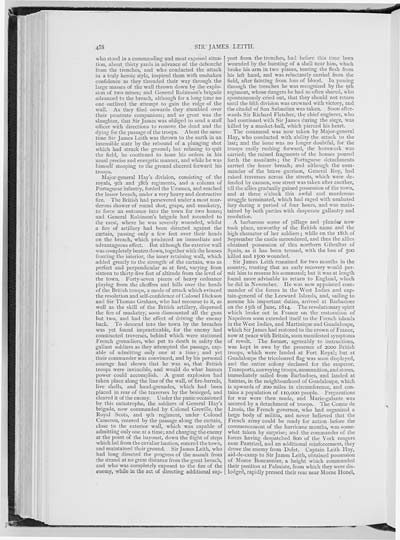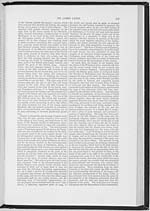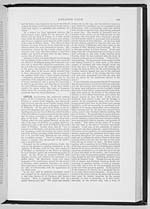488
who stood in a commanding and most exposed situa-
tion, about thirty yards in advance of the debouche
from the trenches, and who conducted the attack
in a truly heroic style, inspired them with unshaken
confidence as they threaded their way through the
large masses of the wall thrown down by the explo-
sion of two mines; and General Robinson's brigade
advanced to the breach, although for a long time no
one outlived the attempt to gain the ridge of the
wall. As they filed onwards they stumbled over
their prostrate companions; and so great was the
slaughter, that Sir James was obliged to send a staff
officer with directions to remove the dead and the
dying for the passage of the troops. About the same
time Sir James Leith was thrown to the earth in an
insensible state by the rebound of a plunging shot
which had struck the ground; but refusing to quit
the field, he continued to issue his orders in his
usual precise and energetic manner, and while he was
himself stooping to the ground cheered forward his
troops.
Major-general Hay's division, consisting of the
royals, 9th and 38th regiments, and a column of
Portuguese infantry, forded the Urumea, and reached
the lesser breach, under a very heavy and destructive
fire. The British had persevered under a most mur-
derous shower of round shot, grape, and musketry,
to force an entrance into the town for two hours;
and General Robinson's brigade had ascended to
the crest, where he was severely wounded, whilst
a fire of artillery had been directed against the
curtain, passing only a few feet over their heads
on the breach, which produced an immediate and
advantageous effect. But although the exterior wall
was completely beaten down, together with the houses
fronting the interior, the inner retaining wall, which
added greatly to the strength of the curtain, was as
perfect and perpendicular as at first, varying from
sixteen to thirty-five feet of altitude from the level of
the town. Forty-seven pieces of heavy ordnance
playing from the choffres and hills over the heads
of the British troops, a mode of attack which evinced
the resolution and self-confidence of Colonel Dickson
and Sir Thomas Graham, who had recourse to it, as
well as the skill of the British artillery, dispersed
the fire of musketry, soon dismounted all the guns
but two, and had the effect of driving the enemy
back. To descend into the town by the breaches
was yet found impracticable, for the enemy had
constructed traverses, behind which were stationed
French grenadiers, who put to death in safety the
gallant soldiers as they attempted the passage, cap-
able of admitting only one at a time; and yet
their commander was convinced, and by his personal
courage had shown that he was so, that British
troops were invincible, and would do what human
power could accomplish. A great explosion had
taken place along the line of the wall, of fire-barrels,
live shells, and hand-grenades, which had been
placed in rear of the traverses by the besieged, and
cleared it of the enemy. Under the panic occasioned
by this catastrophe, the soldiers of General Hay's
brigade, now commanded by Colonel Greville, the
Royal Scots, and 9th regiment, under Colonel
Cameron, entered by the passage along the curtain,
close to the exterior wall, which was capable of
admitting only one at a time; and charging the enemy
at the point of the bayonet, down the flight of steps
which led from the cavalier bastion, entered the town,
and maintained their ground. Sir James Leith, who
had long directed the progress of the assault from
the strand at no great distance from the great breach,
and who was completely exposed to the fire of the
enemy, while in the act of directing additional sup-
port from the trenches, had before this time been
wounded by the bursting of a shell near him, which
broke his arm in two places, tearing the flesh from
his left hand, and was reluctantly carried from the
field, after fainting from loss of blood. In passing
through the trenches he was recognized by the 9th
regiment, whose dangers he had so often shared, who
spontaneously cried out, that they should not return
until the fifth division was crowned with victory, and
the citadel of San Sebastian was taken. Soon after-
wards Sir Richard Fletcher, the chief engineer, who
had continued with Sir James during the siege, was
killed by a musket-ball, which pierced his heart.
The command was now taken by Major-general
Hay, who conducted with ability the attack to the
last; and the issue was no longer doubtful, for the
troops easily rushing forward, the hornwork was
carried; the ruined fragments of the houses poured
forth the assailants; the Portuguese detachments
carried the lesser breach; and although the com-
mander of the brave garrison, General Roy, had
raised traverses across the streets, which were de-
fended by cannon, one street was taken after another,
till the allies gradually gained possession of the town,
and at three o'clock this awful and murderous
struggle terminated, which had raged with unabated
fury during a period of four hours, and was main-
tained by both parties with desperate gallantry and
resolution.
A barbarous scene of pillage and plunder now
took place, unworthy of the British name and the
high character of her soldiers; while on the 18th of
September the castle surrendered, and thus the allies
obtained possession of this northern Gibraltar of
Spain, as it has been termed, with the loss of 500
killed and 1500 wounded.
Sir James Leith remained for two months in the
country, trusting that an early recovery would per-
mit him to resume his command; but it was at length
found more advisable to return to England, which
he did in November. He was now appointed com-
mander of the forces in the West Indies and cap-
tain-general of the Leeward Islands, and, sailing to
assume his important duties, arrived at Barbadoes
on the 15th of June, 1814. The revolutionary spirit
which broke out in France on the restoration of
Napoleon soon extended itself to the French islands
in the West Indies, and Martinique and Guadaloupe,
which Sir James had restored to the crown of France,
now at peace with Britain, soon manifested symptoms
of revolt. The former, agreeably to instructions,
was kept in awe by the presence of 2000 British
troops, which were landed at Fort Royal; but at
Guadaloupe the tricoloured flag was soon displayed,
and the entire colony declared for the emperor.
Transports, conveying troops, ammunition, and stores,
immediately sailed from Barbadoes, and landed at
Saintes, in the neighbourhood of Guadaloupe, which
is upwards of 200 miles in circumference, and con-
tains a population of II 0,000 people. Preparations
for war were then made, and Marie-galante was
secured by a detachment of troops. The Comte de
Linois, the French governor, who had organized a
large body of militia, and never believed that the
French army could be ready for action before the
commencement of the hurricane months, was some-
what taken by surprise; and the commander of the
forces having despatched 800 of the York rangers
near Pautrizel, and an additional reinforcement, they
drove the enemy from Dolet. Captain Leith Hay,
aid-de-camp to Sir James Leith, obtained possession
of Mome Boucannier, a height which commanded
their position at Palmiste, from which they were dis-
lodged, rapidly pressed their rear near Morne Honel,

![]() Universal Viewer |
Universal Viewer | ![]() Mirador |
Large image | Transcription
Mirador |
Large image | Transcription
![]()

